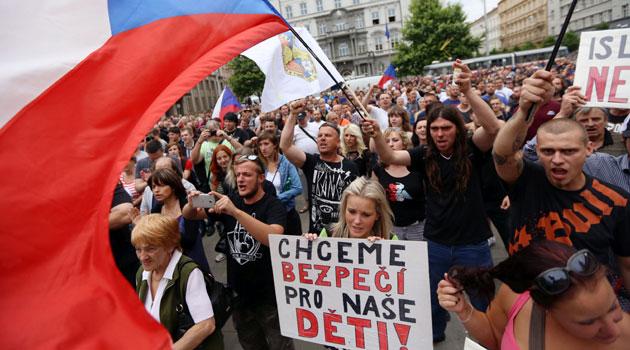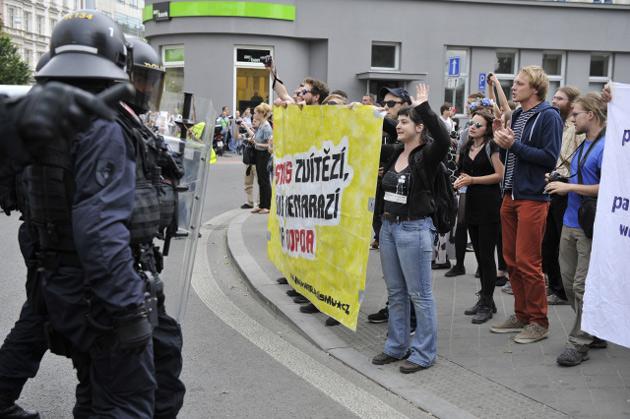Czech report on extremism: Regional elections behind significant growth in extreme-right activity

During the period from July to September this year, the Department of Security Policy of the Czech Interior Ministry noted a total of 79 events directly organized by politically-motivated extremist groups or attended by the members of such groups in large numbers. Of those, 46 were organized by extreme-right groups and just 22 by extreme-left groups and initiatives.
Populist entities termed anti-immigration or anti-Islam held a total of 11 events. The elections to regional assemblies inspired the extremists’ increased activities, but they did not manage to unify their forces.
Even during this recent period the extreme right remained significantly fragmented. The report assesses a period during which a total of 34 felonies were committed with an extremist subtext, nine of which have been solved, and says the significant growth in extreme-right activity was especially due to the October elections.
Since January a total of 121 felonies have been committed with an extremist subtext. The department published a similar number at this time last year.
Compared to the previous quarter, when 45 felonies were found to have been committed with an extremist subtext, this is a significant decline. The annual report of the Security Information Services (BIS) for 2015 was published at the end of the third quarter (in September).
In the annual report, the Czech intelligence services discuss how information originating from Russia is impacting the domestic environment, the aim of which has been, among other things, “developing and nurturing domestic political and social tensions in the Czech Republic (creating puppet organizations, covert and overt support for populist or extremist entities).” In that context, attention was drawn to the continuing production of content by so-called alternative media outlets that are often not transparently funded and do not bother to reveal the sources of their “information “.
The report says it has been possible to observe that the news published by these websites has been completely, uncritically taken on board as fact by some extremist entities. Also, it can be concluded that such “information” often resonates with people who are striving to establish militias or are already active in such groups.
The disinformation campaign in the last quarter was designed to particularly suit anti-immigration, anti-Islamic entities and right-wing extremists. A common feature of this alternative news production has been criticism of the European Union and NATO, states the third quarter report.
Workers’ Social Justice Party (DSSS) in league with LEV 21
In connection with the regional elections, extreme-right groups intensified their activities, the report says. The Workers’ Social Justice Party (DSSS) primarily focused on the Ústecký Region, where it formed a coalition with the National Socialists-LEV 21 party.
The DSSS results continue to be limited by an ebb or lack of interest among its members and supporters. Among the main causes of its failure were interpersonal disputes and especially the party’s financial crisis.
Furthermore, the party is competing with other similarly-oriented entities for supporters, and despite the efforts of its Workers’ Youth organization to maintain contacts with like-minded entities, the prestige of the DSSS in the context of the right-wing extremist scene continued to fall. The only more significant public event organized by the DSSS and the Workers’ Youth was an assembly in Ústí nad Labem on 28 September, which was attended by approximately 150 people.
National Democracy and Adam B. Bartoš all but in seclusion
Support for the National Democracy (ND) party has similarly declined in recent months. The party ran candidates in all 13 regions during the October elections.
ND especially hoped to harvest votes through anti-immigration rhetoric. With the decline of public interest in that issue, however, interest to participate in the party’s events waned, as did other expressions of support for it.
Moreover, the topic was also embraced by other political parties whose activities had a wider impact. Party chair Adam B. Bartoš has also been charged with committing extremist-related felonies and awaits trial.
National Militia and the Consul of the self-proclaimed “People’s Republic of Donetsk”
The report says the National Militia (Národní domobrana) organization has remained active. The group was originally a project of the ND party.
Like the party, however, the militia has not managed to gain new supporters. Nela Lisková, a member of the militia’s governing body, the so-called “National Militia Council”, drew more attention to herself after she was appointed Consul for the internationally unrecognized, self-proclaimed People’s Republic of Donetsk in eastern Ukraine, and opened a “representation center” for it on 1 September in Ostrava.
“Odin’s Soldiers” rely on provocation and intimidation
The report says that in late 2015, mainly in the Most district, the first cell of the so-called “Odin’s Soldiers” (Ódinový vojáci) began operations. The group is inspired by an organization of the same name in Finland and currently has about 30 members originating from the hooligan and neo-Nazi scene, focusing their actions especially in the Teplice area, where tourists from Muslim countries frequent the local spa.
In addition to holding public assemblies, the group is also involved in running so-called “patrols”. These have been superficially interpreted as actions “defending” European culture and traditions against Islam.
In reality, however, these “patrols” have acted very provocatively against the Muslim community and against those opposed to the extreme right. Their activities have only one obvious impact, namely, creating an atmosphere of fear and hatred and escalating tensions.
